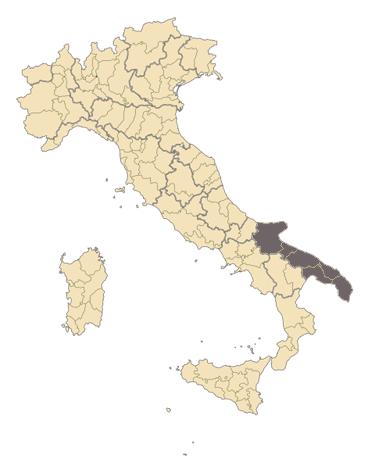
Apulia
 Puglia (Apulia) is a region located in the north eastern part of the ‘Italian shoe’, more or less on the line of the ‘heel’. This is a region known as Italy’s granary and the basic crops grown here are olives and wine. This region is responsible for over one half of the entire olive oil production in Italy. The crops enjoy a climate far more favourable than in Sicily or Calabria. It is not a mountainous region, high land and lowlands prevail. For a long time wines from Puglia did not enjoy a good opinion, the majority of production was consumed locally. However, far back Apulia used to be called the cellar of Europe, leaving behind such regions as Veneto Or Sicily. Unfortunately, great winemaking traditions have been long forgotten. However, significant investment made in the region allowed producers to increase the quality of wines produced.
Puglia (Apulia) is a region located in the north eastern part of the ‘Italian shoe’, more or less on the line of the ‘heel’. This is a region known as Italy’s granary and the basic crops grown here are olives and wine. This region is responsible for over one half of the entire olive oil production in Italy. The crops enjoy a climate far more favourable than in Sicily or Calabria. It is not a mountainous region, high land and lowlands prevail. For a long time wines from Puglia did not enjoy a good opinion, the majority of production was consumed locally. However, far back Apulia used to be called the cellar of Europe, leaving behind such regions as Veneto Or Sicily. Unfortunately, great winemaking traditions have been long forgotten. However, significant investment made in the region allowed producers to increase the quality of wines produced.
The region of Apulia can be divided into two grape growing areas, where the line is drawn at the cities of Brindisi and Tarent.
Terrains located in the northern part are hills and highlands, and are characterised with a moderate climate which can even – high up on the Murge plateaus - be a cold one. Wines produced there are dry, moderately strong, with an impressive fruit note, good acidity and prominent bouquet. The production of red wines usually utilizes local varieties of Uva di Troia or Bombino Nero and Montepulciano and Sangiovese. White wines are produced mainly from the Verdeca grape, although other varieties such as Bianco d’Alessano, Malvasia, Trebbiano and Bombino Bianco are also present. Throughout the entire region experiments are carried out with the use of international grape varieties, light ones – as Chardonnay, Pinot Bianco and Sauvignon, and dark ones –as Cabernet, Merlot, Malbec, Pinot Nero and Syrah.
To the south from the Line of Brindisi – Tarent, there lies the Salentine Peninsula, the most eastern protruding point of Italy dominated by low, ruffled hills stretched out between the Adriatic Sea and the Ionian Sea. Although the Salentine Peninsula is characterized by high temperatures, thanks to sea currents and light gusts of wind there is no swelter. Traditional wines from the Salentine Peninsula were always strong, dark red wines produced from the Primitivo variety. However, recently more fresh red and rose and unexpectedly light and fruity white wines have been appearing.
In the past, Primitivo was used mainly as wine for admixtures, however the new generation of producers have produced a tipple characterised by high class that is in no way worse that its American counterpart. Primitivo, the twin seedling of the Californian Zinfandel comes from Craotia. There it is called Crljenak Kaštelanski. It reached Apulia probably in the 18th Century. The name „primitivo” means „the earliest”. Classic Primitivo is characterized by an extremely high tannin and alcohol content. In Manduria, one of the Primitivo variants contains 18% of alcohol but in the case of table and quality wines, the alcohol content is reduced to 14%.
Among many DOC appellations In Puglia (25) the most prominent are Salice Salentino and DOC Primitivo di Manduria.
One of the most well known wine makers In Puglia is Albano Carisi. Yes, it is the very same Albano z from the duet with Romina Power. He called one of his best wines "Felicita" (chardonnay and sauvignon blanc).
CANTINE DE FALCO
The Cantine de Falco vineyard has been the leading wine producer in the Saleto area for over half a century. Throughout this entire period, it has maintained its identity and family name. Two generations sharing the same passion for wine.
Cantine De Falco covers 20 ha of vineyards in the Saleto area, nearby Lecce. This part of Apulia is characterized by conditions that are particularly favourable for varieties such as Negroamaro, Malvasia, Primitivo and Nero di Troia. Careful selection of grapes and vast experience in wine production following family tradition have resulted in the fact that wines produced here are of extremely high quality and are valued in Italy and abroad.
The entire growth and production process is very traditional, including only hand picking and hand selection to allow to maintain the characteristic qualities of the grape.
All production stages are supervised with great care, and the experience of Salvatore de Falco combined with enthusiasm of his son Gabriel give the company a cutting edge in strengthening the position of the company on the wine production market. A characteristic feature of their production is extending the maceration process for as long as possible, in order to draw possibly as much aroma and colour from the grape as possible. Moreover, the vineyard went for mild aging in barrels and bottles in order to extract the soft, velvety tannins of the Primitivo and Negroamaro varieties.

